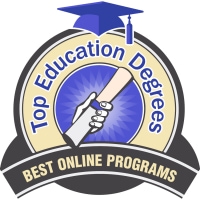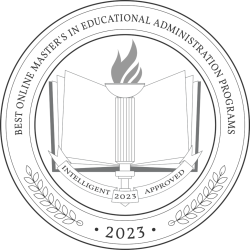Mitchell Scholars Program
Mitchell Teachers
Benefits to earning a
Master’s Degree in Education:
Improve your teaching skills
Keep up on advances in education
Focus on
a specialty
Stand out from your peers
Take on a
leadership role
Increase your earning potential
What’s the Difference at DWU?
-
100% online
Complete your coursework anywhere, anytime. -
7-week courses
Courses are accelerated, so you only focus on the skills that are relevant to teaching today. -
15 months
If you attend full-time, you can complete the program in under two years. If you need a slower pace, you can take classes part-time. -
Designed by teachers for teachers
Our M.Ed. program is designed specifically for current teachers looking to increase knowledge, skill and ability. With experienced faculty and relevant courses, you will succeed.
Degree Options
What does your future hold? The DWU Master of Arts in Education program is designed for passionate educators who want to grow, lead, and inspire. Whether you’re strengthening your impact in the classroom, mentoring others, or exploring leadership roles, DWU offers graduate degree options that align with your goals and ignite your professional purpose.
- Advanced Teacher Pathway
- Educational Policy and Administration
- English as a New Language
- K–12 Principal
Regardless of your path, you will be required to take two courses: Behavior Management Principles and Supporting English Learners in the Classroom.
Master of Education - Advanced Teacher Pathway
Become a master of your classroom! The Advanced Teacher Pathway offers flexible, stackable options to strengthen your classroom approach and leadership skills. Design a personalized degree by combining core classes, one or more graduate certificates, and additional electives. This degree requires 36 credit hours.
Required Courses (6 credits)
EDU 620 Behavior Management Principles
ENL 658 Supporting English Learners in the Classroom
Behavior Management (12 credits)
EDU 620 Behavior Management Principles
EDU 633 Inclusive Classroom Culture
EDU 654 Fostering Resilient Learning Through Trauma-Informed Teaching
EDU 668 Behavior Strategies and Supporting Behavior
Educational Policy (12 credits)
EDU 651 Education in a Culture of Change
EDU 655 Public Policy in Education
EDU 657 Education Finance and Funding
EDU 687 Legal and Ethical Issues in Education
English As a New Language (18 credits)
ENL 662 Foundations in English as a New Language
ENL 663 Literacy for Multilingual Learners
ENL 664 Methods for Teaching English as a New Language
ENL 665 Culture and Linguistics
ENL 668 Assessment of ENL Students and Programs
ENL 671 Language in Learning Across the Curriculum
Research & Analysis in Education (9 credits)
EDU 603 Statistical Analysis in Education
EDU 683 Assessment, Planning, and Evaluation
EDU 690 Research Methodologies
Athletic and Activities Administration (18 credits)
BUS 606 Adaptive Leadership and Change Management
BUS 617 Employee Life Cycle
BUS 627 Event and Facilities Planning and Management
BUS 628 Advanced Public Relations and Promotion
BUS 629 Revenue Generation and Management
BUS 636 Conflict Management
Differentiation for All Learners (15 credits)
EDU 611 Differentiation in Practice
EDU 614 Understanding to Support the Neurodivergent Child
EDU 616 Fostering Belonging in Diverse Classrooms
EDU 618 Strategies for Talented and Gifted Education
ENL 658 Supporting English Learners in the Classroom
Teacher Leadership (12 credits)
EDU 615 School Improvement
EDU 672 Introduction to Teacher Leadership
EDU 674 Advocacy and Agency in Education
EDU 677 Instructional Supervision
Master of Education - Educational Policy and Administration
If you have a passion for educational policy and leadership, this is your degree option! It requires 36 coursework credit hours, including a capstone experience consisting of your choice of either a research thesis or practicum and comprehensive examination.
Courses
EDU 603 Statistical Analysis in Education
EDU 610 Human Relations: Multiculturalism
EDU 620 Behavior Management Principles
EDU 655 Public Policy in Education
EDU 659 Educational Leadership
EDU 661 Advanced Educational Psychology
EDU 675 Education Law
EDU 683 Assessment, Planning, and Evaluation
EDU 685 Teaching and Learning
EDU 687 Legal and Ethical Issues in Education
EDU 690 Research Methodologies
EDU 691 Educational Policy and Administration Practicum or Thesis
ENL 658 Supporting English Learners in the Classroom
SPD 601 The All-Inclusive Classroom
Master of Education - English as a New Language (ENL)
ENL teachers are in high demand! English as a New Language education endorsement requires coursework that studies linguistics, development of curriculum and instruction for new language acquisition, language and culture, program assessment, reading for students with limited English proficiency, and English as a New Language methodology course. The program requires 36 coursework credit hours and the completion of a comprehensive exam.
Courses
EDU 613 School and Community Relations
EDU 620 Behavior Management Principles
EDU 675 Education Law
EDU 677 Instructional Supervision
EDU 691 Educational Policy and Administration Practicum or Thesis
ENL 651 Practicum for the Elementary Teacher or Practicum for the Mid and High School Teacher
ENL 658 Supporting English Learners in the Classroom
ENL 662 Foundations in English as a New Language
ENL 663 Literacy for Multilingual Learners
ENL 664 Methods for Teaching English as a New Language
ENL 665 Culture and Linguistics
ENL 667 Applied Linguistics
ENL 668 Assessment of ENL Students and Programs
ENL 669 Curriculum, Programs, and Policies for ENL
ENL 670 Seminar in Special Topics
Master of Education - K-12 Principal
If you are interested in educational leadership in K-12 schools, have a bachelor’s degree in either elementary or secondary education, and three years of teaching experience, this is the master's degree for you! This program requires 36 coursework credit hours, including an internship, and the completion of a comprehensive exam.
Courses
BUS 617 Employee Life Cycle
EDU 603 Statistical Analysis in Education
EDU 610 Human Relations: Multiculturalism
EDU 613 School and Community Relations
EDU 615 School Improvement
EDU 620 Behavior Management Principles
EDU 659 Educational Leadership
EDU 665 Curriculum & Teaching Methods
EDU 673 Educational Administration
EDU 675 Education Law
EDU 677 Instructional Supervision
EDU 690 Research Methodologies
EDU 693 Internship
ENL 658 Supporting English Learners in the Classroom
Accreditation and Rankings
The DWU Master of Arts in Education is accredited by the Higher Learning Commission, an institutional accreditor recognized by the U.S. Department of Education, and is affirmed by the South Dakota Department of Education and NC-SARA.
We are honored.
2025 Best Online Master’s in Education Programs
U.S. News and World Report

Best Online College in South Dakota
OnlineU

Top 50 Best Master’s in Educational Leadership Online
Top Education Degrees

Best Online Master’s in Educational Administration
Intelligent.com
Admission Requirements
To be eligible for admission, you must meet the following criteria:
- A bachelor’s degree from an accredited institution
- Minimum undergraduate cumulative grade point average (GPA) of 2.7
After you have completed the online application, we will contact you to explain how to complete the submission process. You will be asked to provide:
- An official transcript from your bachelor’s degree-awarding institution
- A letter of support from your evaluator
- A personal résumé
Following your acceptance into the program, you will be required to submit a promissory note declaring your commitment to employment with the Mitchell School District for five years. The five-year commitment will begin upon completion of your master’s degree.
Space is limited.
Cost
Great news! Tuition and books are covered.
Your Contacts
As you explore the M.Ed. program, you will work with an admissions representative, our program director, and director of education and community engagement.














